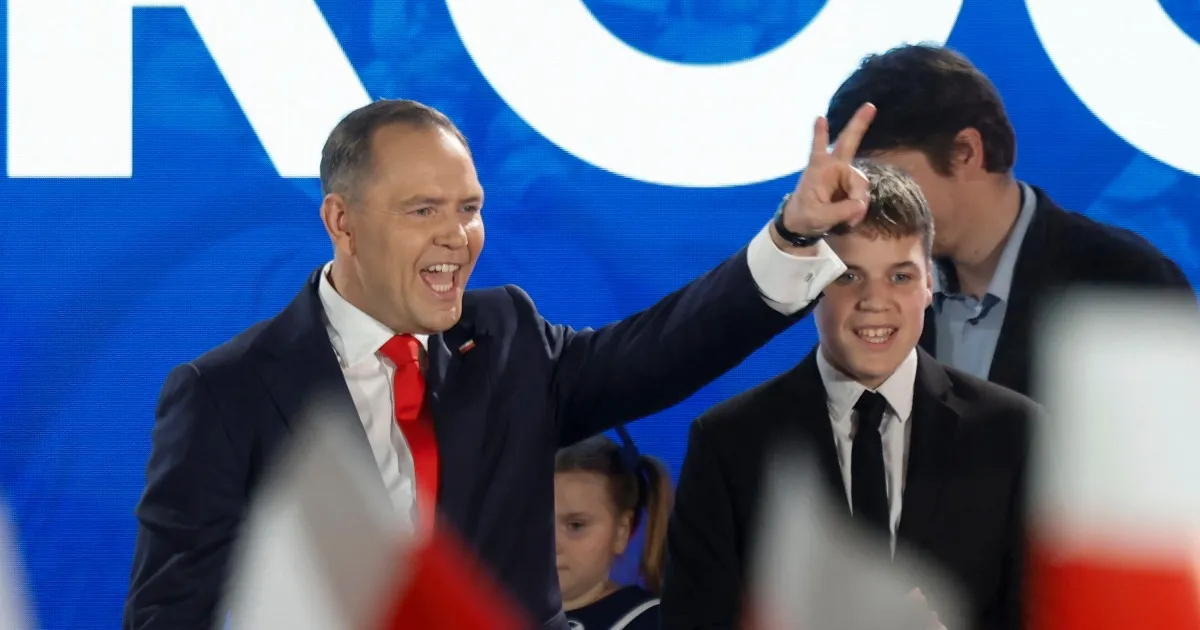
In a closely contested presidential runoff held over the weekend, Karol Nawrocki, representing the conservative party Law and Justice, emerged victorious in Poland. According to the final vote count released on Monday, Nawrocki secured 50.89% of the votes, narrowly defeating the liberal Warsaw Mayor Rafał Trzaskowski, who garnered 49.11%. This election has brought the nation to a standstill, revealing significant political and social divisions within the country, particularly along the eastern flank of NATO and the European Union.
The political atmosphere in Poland has been tense since the first round of voting two weeks prior, with early exit polls indicating a potential victory for Trzaskowski. However, as updated polling data emerged, the tide shifted, ultimately favoring Nawrocki. His election signals a likely shift towards a more populist and nationalist approach in Polish governance, a sentiment echoed by his endorsement from former U.S. President Donald Trump.
While the Polish political system primarily empowers the Prime Minister, who is chosen by the parliament, the president plays a crucial role in shaping foreign policy and has the authority to veto legislation. Nawrocki will take office succeeding Andrzej Duda, a conservative president whose tenure concludes on August 6. Under the Polish constitution, the presidential term lasts five years, with the possibility of one re-election.
Prime Minister Donald Tusk, who assumed office in late 2023, leads a coalition government marked by a broad ideological spectrum. This diversity has impeded the fulfillment of key electoral promises, such as relaxing the restrictive abortion laws and enacting a civil partnership law for same-sex couples. Moreover, Duda's veto power has posed additional challenges for Tusk, hindering efforts to reverse laws deemed undemocratic by the European Union.
Political analysts suggest that the unfulfilled promises could jeopardize Tusk's ability to maintain his position until the next parliamentary election scheduled for late 2027, especially with the Law and Justice party potentially offering cooperation to conservatives within Tusk's coalition.
At 42, Nawrocki is not only a politician but also an amateur boxer and historian. He was selected by Law and Justice as part of a strategy to rejuvenate the party’s image after losing power to Tusk’s centrist coalition in 2023. Observers had speculated that the party would struggle to regain influence, making Nawrocki's selection as a fresh face a strategic move. Previously, he led the Institute of National Remembrance, focusing on nationalist historical narratives and advocating for the removal of Soviet-era monuments in Poland, which led to Russia placing him on a wanted list.
Nawrocki's supporters view him as a champion of traditional and patriotic values, particularly appealing to those opposing secular trends and advocating for LGBTQ+ visibility. Despite facing allegations of connections to criminal figures and involvement in a violent street brawl, Nawrocki maintains that such claims are politically motivated and dismisses the past incidents as “noble” fights.
The support from Trump has been a significant factor in Nawrocki's campaign. Trump personally invited him to the White House last month, and the conservative group CPAC hosted its first meeting in Poland to rally support for Nawrocki. Notably, Kristi Noem, the U.S. Homeland Security Secretary and a staunch Trump ally, publicly endorsed Nawrocki, suggesting that his presidency could strengthen military ties between the U.S. and Poland, where approximately 10,000 U.S. troops are stationed.
Supporters of Nawrocki often express their belief that he will restore a sense of “normality” akin to that experienced during Trump’s presidency, frequently displaying U.S. flags at his rallies. They view him as a candidate who could foster improved relations with the Trump administration, setting the stage for a transformative era in Polish politics.